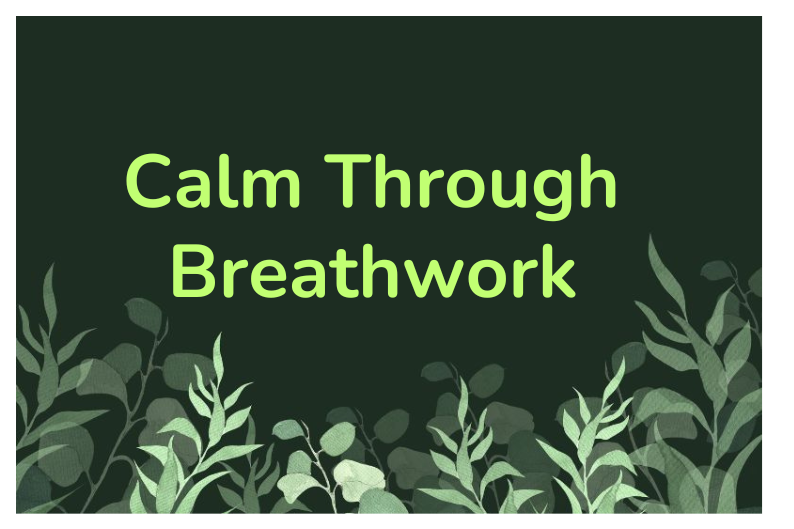
Discover Simple Deep Breathing Techniques for Daily Calm
Deep Breathing, Breathwork Benefits, Natural Anxiety Help: Simple Ways to Find Calm Every Day
Many people today feel overwhelmed by stress, leading to trouble with focus, sleep, or even enjoying simple moments. Experts like Gary Brecka and Barbara O’Neil suggest looking at nature’s gifts, such as deep breathing, as gentle ways to find balance again. Deep breathing and breathwork are powerful, natural techniques that can help calm anxious feelings and support long-term well-being.
Breathing exercises are more than just a way to relax for a moment. By practicing methods like box breathing or the 4-7-8 technique, anyone can give their mind and body the tools they need to manage stress naturally. These approaches can boost relaxation, sharpen focus, and help people feel more present during their day, all without complicated steps or special equipment. When paired with high-quality herbal supplements from MC Herbs, breathwork becomes an even more effective part of a natural wellness routine.
MC Herbs believes that supporting the body with natural solutions—like deep breathing and carefully chosen herbal blends—can make a big difference in handling anxiety and feeling your best. Choosing simple, grounded practices steers people toward a calmer, healthier way of living.
Key Takeaways
- Deep breathing and breathwork support natural anxiety relief
- Easy breathing techniques help manage stress and boost well-being
- Combining breathwork with MC Herbs supplements may enhance results
Deep Breathing and Breathwork: Foundations for Natural Anxiety Help
Deep breathing and breathwork are simple yet powerful practices that help calm the mind and body. They naturally support anxiety relief and help restore inner peace through the regulation of the autonomic nervous system.
How Deep Breathing Influences Anxiety and Stress
Shallow, rapid breathing often triggers the body’s stress response, making anxiety worse. Deep breathing works in the opposite way, telling the body it’s time to relax. With slow, controlled breaths, the body shifts from feeling tense to more restful.
People who practice mindful deep breathing tend to notice steady shifts in their anxiety levels. Regular practices help lower the heart rate and send more oxygen to the brain, creating a sense of calm. Studies confirm simple techniques, such as diaphragmatic breathing, can help reduce feelings of anxiety and stress quickly.
Deep breathing is easy to learn and can be practiced almost anywhere—at home, in school, or at work. It encourages a break from anxious thinking and grounds the mind in the present moment.
The Role of the Nervous System: Parasympathetic vs. Sympathetic
Two branches of the autonomic nervous system play a big role in stress: the sympathetic (“fight or flight”) and the parasympathetic (“rest and digest”). When anxiety hits, the sympathetic branch gets overly active, triggering worries and tension.
Practices like yoga, meditation, and breathwork help shift control to the parasympathetic nervous system. This shift slows heart rate, lowers blood pressure, and creates a feeling of safety. Techniques that emphasize long, slow exhales activate this calming response.
Natural health advocates, including Gary Brecka and Barbara O’Neil, stress the importance of conscious breathing for resetting these nervous system patterns. Taking control of the breath is a first step to regaining steady, peaceful energy.
Science-Backed Benefits of Breathwork
Breathwork is backed by research showing strong improvements in mental well-being and anxiety reduction. Even short sessions can have positive effects. A review of multiple studies confirms that controlled breathing exercises reduce tension, help focus the mind, and restore balance in daily life.
Techniques such as box breathing, 4-7-8 breathing, and alternate nostril breathing are easy to use and adapt. They don’t require special equipment or skills. According to current studies, these methods offer rapid relief from the physical symptoms of stress.
Adding quality supplements from MC Herbs can enhance these natural benefits, supporting the body’s ability to handle stress and promote a calm sense of well-being.
How to Begin a Deep Breathing Practice
Starting a deep breathing routine is simple. Sit or lie down in a comfortable spot, close the eyes, and focus on slow breaths in and out. Placing a hand on the belly helps ensure each breath is deep and full.
Try box breathing: inhale for 4 counts, hold for 4, exhale for 4, then hold again for 4. Repeat this pattern for a few cycles. With time, it becomes easier to lengthen the breath and notice the effects.
Pairing breathwork with MC Herbs’ calming herbal blends can help sustain natural anxiety relief. Practicing daily, even for five minutes, supports a calmer state of mind and improves overall well-being.
Breathing Techniques for Anxiety Relief and Well-Being
Simple breathing techniques calm the body, boost oxygen flow, and help control stress hormones naturally. Practicing these exercises daily supports emotional balance, lowers cortisol, and can make it easier to handle tough moments.
Diaphragmatic Breathing (Belly Breathing)
Diaphragmatic breathing, also known as belly breathing, focuses on drawing air deep into the lower lungs. This method encourages the use of the diaphragm rather than the chest muscles.
He or she can practice by placing a hand on the belly and inhaling slowly through the nose, noticing the hand rise. On each slow exhale through the mouth, the belly falls. This helps slow the heart rate and increases heart rate variability, which is linked to better stress management.
MC Herbs recommends combining belly breathing with calming herbal supplements, such as ashwagandha or holy basil, to balance cortisol levels. Consistency is important—just five minutes daily has shown to improve emotional resilience, especially for those feeling constant worry or dealing with asthma. Learn more about this calming approach at US News Health.
Box Breathing and Structured Exercises
Box breathing, or four-square breathing, is a structured technique used to reduce anxiety and sharpen mental focus. This exercise involves inhaling for four counts, holding the breath for four, exhaling for four, and then holding again for four.
Guided box breathing relaxes the muscles and supports balanced blood pressure. Practitioners who feel overwhelmed can use this method anywhere—at home, at work, or before sleep. Structured exercises like this quickly calm the nervous system and lower stress hormone levels.
Many natural health advocates, including Gary Brecka, praise these routines for their gentle effect on the mind and body. When paired with MC Herbs’ soothing botanicals, box breathing can help maintain a steady mood and boost overall well-being. Try discovering more techniques at The Mindfulness App.
4-7-8 Breathing for Relaxation and Sleep
The 4-7-8 breathing method is simple and is used to promote relaxation and restful sleep. Start by inhaling quietly through the nose for four counts, holding the breath for seven counts, then slowly exhaling through the mouth for eight counts.
This practice supports lower blood pressure and relaxes the body before sleep. By holding the breath, the oxygen flow increases, which can help the body clear stress hormones faster. Practicing 4-7-8 breathing at bedtime settles racing thoughts.
Adding a calming herbal tea from MC Herbs just before this exercise creates an even more tranquil nighttime routine. Consistent nightly use helps people drift off naturally. For easy steps, see Verywell Health’s guide.
Progressive Muscle Relaxation with Breath
Progressive muscle relaxation combines mindful breathing with gentle muscle tensing and releasing. While inhaling, a person slowly tenses a muscle group (like their shoulders), then releases that tension while exhaling.
This method helps release stored tension in the body and allows for deeper relaxation. It is especially powerful for people who experience muscle tightness from daily stress or anxiety. The technique also supports better heart rate variability, contributing to overall calmness.
Barbara O’Neil and other natural health advocates often suggest using MC Herbs’ magnesium blends to further ease muscle tension during breathing exercises. Done regularly, this combination helps the body stay more relaxed and resilient during stressful times. To learn more about this approach, see the guide from Positive Psychology.
Frequently Asked Questions
Deep breathing can help calm the mind and support emotional health. It works with the body’s natural systems to manage stress and bring a sense of balance.
What are the mental health benefits of practicing deep breathing?
Deep breathing helps lower anxiety and boosts mood by engaging the parasympathetic nervous system, the part of the body that signals relaxation. Regular practice can lead to improved focus and better emotional control. Many people also find they feel more centered and able to cope with daily pressures after just a few sessions.
How can deep breathing exercises assist during an anxiety attack?
During an anxiety attack, slow, mindful breathing can signal the body to slow the heart rate and reduce feelings of panic. Focusing on breathing draws the mind away from racing thoughts and helps regain a sense of control. Techniques such as counting each breath can create a calming rhythm, making it easier to move through intense moments.
In what ways does deep breathing influence brain function?
Deep breathing increases oxygen flow to the brain, which can help sharpen focus and support mental clarity. Breathing slowly and deeply has been shown to activate brain regions tied to relaxation and calm. Natural health experts, such as Gary Brecka, often highlight the power of breath to support healthy brain waves and emotional regulation.
Can you describe the relationship between deep breathing and stress reduction?
Deep and controlled breathing helps lower levels of stress hormones like cortisol. It supports the body's rest-and-digest system, counteracting the fight-or-flight reaction associated with stress and anxiety. Practices like conscious breathing have been shown to help people feel calmer and more at ease even on stressful days.
What are some potential risks to be aware of when practicing breathwork?
Most people find breathwork gentle and safe, but pushing too hard, breathing too quickly, or overdoing new techniques may cause lightheadedness or tingling. It's best to start slow, find a comfortable pace, and listen to the body’s signals. Natural guidance, such as that favored by Barbara O’Neil, recommends gently building practice over time and considering support from natural supplements like those offered by MC Herbs.
Are there specific deep breathing techniques recommended for natural anxiety relief?
Yes, several techniques are easy to learn and can be practiced almost anywhere. Box breathing, where one inhales, holds, exhales, and holds again for even counts, is simple and effective for calming nerves. The 4-7-8 method also encourages relaxation by guiding how long to breathe in, hold, and breathe out. Combining these techniques with calming herbal blends from MC Herbs can provide extra support for those seeking natural relief.
